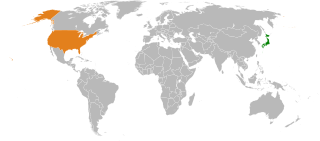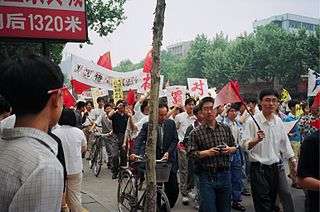
There have been a number of significant disputes between various Koreanic and Japonic states. The two regions have a long history of relations as immediate neighbors that has been marked with conflict. One of the most significant issues is the Japanese colonization of Korea that began with the Japan–Korea Treaty of 1910 and ended with the surrender of Japan at the end of World War II.
A trade war is an economic conflict often resulting from extreme protectionism in which states raise or create tariffs or other trade barriers against each other in response to trade barriers created by the other party. If tariffs are the exclusive mechanism, then such conflicts are known as customs wars, toll wars, or tariff wars; as a reprisal, the latter state may also increase the tariffs. Trade war arises only if the competitive protection between states is of the same type and it is not valid in case of dumping exports. Increased protection causes both nations' output compositions to move towards their autarky position. Minor trade disagreements are often called trade disputes when the war metaphor is hyperbolic.

Anti-Japanese sentiment, a form of racism against Asians, involves the hatred or fear of anything which is Japanese, be it its culture or its people.

International relations between Japan and the United States began in the late 18th and early 19th century with the diplomatic but force-backed missions of U.S. ship captains James Glynn and Matthew C. Perry to the Tokugawa shogunate. Following the Meiji Restoration, the countries maintained relatively cordial relations. Potential disputes were resolved. Japan acknowledged American control of Hawaii and the Philippines, and the United States reciprocated regarding Korea. Disagreements about Japanese immigration to the U.S. were resolved in 1907. The two were allies against Germany in World War I.

Historic Relations: For over 15 centuries, the relationship between Japan and Korea was one of both cultural and economic exchanges, as well as political and military confrontations. During the ancient era, exchanges of cultures and ideas between Japan and mainland Asia were common through migration, diplomatic contact and trade between the two. Tensions over historic military confrontations still affect modern relations. The Mimizuka monument near Kyoto enshrining the mutilated body parts of at least 38,000 Koreans killed during the Japanese invasions of Korea from 1592 to 1598 illustrates this effect.
An anti-boycott, counter-boycott, or buycott is the excess buying of a particular brand or product in an attempt to counter a boycott of the same brand or product. Anti-boycott measures could also be in the form of laws and regulations adopted by a state to prohibit the act of boycott among its citizens.

The People's Republic of China (PRC) and the Republic of Korea formally established modern diplomatic relations in August 1992. South Korea was the last Asian country to establish relations with the People's Republic of China. In recent years, China and South Korea have endeavored to boost their strategic and cooperative partnership in numerous sectors, as well as promoting a high level relationship. Trade, tourism and multiculturalism, specifically, have been the most important factors of strengthening two neighbouring countries' cooperative partnership. Despite this, historical, political and cultural disputes have still played several roles on the relations between South Korea and China, especially with China being politically aligned with North Korea.

Russia–South Korea relations or Russian–South Korean relations are the bilateral foreign relations between Russia and South Korea. Modern relations between the two countries began on September 30, 1990. Due to the 2022 Russian invasion of Ukraine, relations became very tense after South Korea imposed sanctions against Russia. Russia placed South Korea on a list of "unfriendly countries", along with Taiwan, Japan, Singapore, the United States, European Union members, NATO members, Australia, New Zealand, Switzerland, Micronesia and Ukraine.

Anti-Japanese sentiment in Korean society has its roots in historic, cultural, and nationalistic sentiments.

China–Japan relations or Sino-Japanese relations are the bilateral relations between China and Japan. The countries are geographically separated by the East China Sea. Japan has been strongly influenced throughout its history by China, especially by the East and Southeast through the gradual process of Sinicization with its language, architecture, culture, cuisine, religion, philosophy, and law. When Japan was forced to open trade relations with the West after the Perry Expedition in the mid-19th century, Japan plunged itself through an active process of Westernization during the Meiji Restoration in 1868 and began viewing China under the Qing dynasty as an antiquated civilization unable to defend itself against foreign forces—in part due to the First and Second Opium Wars along with the Eight-Nation Alliance's involvement in suppressing the Boxer Rebellion. Japan eventually took advantage of such weaknesses by invading China, including the First Sino-Japanese War and the Second Sino-Japanese War.

The Japan–Korea Undersea Tunnel, or Korea–Japan Undersea Tunnel, is a proposed tunnel project to connect Japan with South Korea via an undersea tunnel crossing the Korea Strait that would use the strait islands of Iki and Tsushima, a straight-line distance of approximately 128 kilometers (80 mi) at its shortest.

Japan–South Korea relations refers to the diplomatic relations between Japan and the Republic of Korea. As the Sea of Japan and the Korea Strait geographically separate the two nations, political interactions date back from the 6th century when the kingdom of Baekje officially established relations with the Yamato Kingship of Japan. During the ancient era, the southern region of the Korean Peninsula often served as the closest port for economic trade and cultural exchange between the Japanese archipelago and mainland Asia. Such relations would continue by the late 19th century when both Japan and Korea undergo modernization from Western powers up until 1910, when Korea became a colony of Japan.

The Arab League boycott of Israel is a strategy adopted by the Arab League and its member states to boycott economic and other relations between Arabs and the Arab states and Israel and specifically stopping all trade with Israel which adds to that country's economic and military strength. A secondary boycott was later imposed, to boycott non-Israeli companies that do business with Israel, and later a tertiary boycott involved the blacklisting of firms that do business with other companies that do business with Israel. An official organized boycott of the Yishuv was adopted by the Arab League in December 1945, and persisted against Israel after its establishment in 1948. The boycott was designed to weaken Jewish industry in Palestine and to deter Jewish immigration to the region.
There have been campaigns advocating for a boycott of products made in China. Commonly cited reasons for boycotting China include the alleged low quality of products, human rights issues, territorial conflicts involving China, support for separatist movements within China, and objection to more specific matters relating to China, including the government's mismanagement of the COVID-19 pandemic.

There is a history of anti-Americanism in China, beginning with the general disdain for foreigners in the early 19th century that culminated in the Boxer Rebellion of 1900, which the United States Marine Corps participated with other powers in suppressing. The 1905 Chinese boycott of American goods to protest discrimination against the Chinese living in America had a major negative impact on Chinese attitudes. After the Chinese Civil War, the United States and China fought an undeclared war during the Korean War, in which 148,000 Chinese soldiers died, that left bitter feelings on both sides. Relations warmed up after 1970, but large-scale anti-American sentiments significantly increased since US President Donald Trump launched a trade war against China in the late 2010s.

Korea has had a long history of both resistance against and subordination to Imperial China. Until the onset of Western imperialism in the 19th century, Korea had been part of the sinocentric East Asian regional order.

An economic conflict between China and the United States has been ongoing since January 2018, when U.S. President Donald Trump began setting tariffs and other trade barriers on China with the goal of forcing it to make changes to what the U.S. says are longstanding unfair trade practices and intellectual property theft. The first Trump administration stated that these practices may contribute to the U.S.–China trade deficit, and that the Chinese government requires transfer of American technology to China. In response to US trade measures, the Chinese government accused the Trump administration of engaging in nationalist protectionism and took retaliatory action. After the trade war escalated through 2019, in January 2020 the two sides reached a tense phase-one agreement. By the end of the Trump's first presidency, the trade war was widely characterized as a failure for the United States.

The Japan–South Korea trade dispute, also known as the Japan–South Korea economic war, was an economic conflict between Japan and South Korea.

In 2019, the boycott of Japanese products and travel began in South Korea due to trade disputes between South Korea and Japan.
The League of Women Shoppers (LWS) was an American consumer advocacy group that also participated in collective actions that worked towards social justice for workers. They also fought against racial discrimination of all kinds. LWS was founded in 1935 in New York City and Aline Davis Hays served as the first president. Chapters of LWS were formed in cities around the country. Members of LWS were involved in different actions. Some were involved in educating consumers on labor issues. Others watched legislation and put out alerts for members to contact their representatives about the issues. LWS members, most of whom were middle class or upper class women, participated in strikes and pickets and served as allies to working class women and African-American workers. Because of their collective action techniques and also because of animosity from members of another consumer group, Consumers' Research (CR), LWS was accused of Un-American activities in the early 1940s. They were blacklisted and members began to leave, causing the group to dissolve in 1949.
















